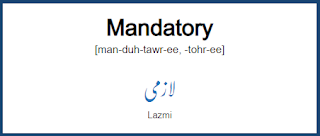Mandatory Meaning in Urdu:
Mandatory meaning in
Urdu is a recent phenomenon. The meaning of a word in Urdu differs from one
Urdu language to another. The purpose of this article is to examine the meaning
of the word in Urdu and how it varies across the different languages. The article
also examines the significance of the mandatory meaning in Urdu.
When we speak of the
meaning of a word, it means the obvious definition of the word. In this
article, I will examine the mandatory
meaning in Urdu. This mandatory meaning refers to the way the word has
been understood by the people, i.e. a lot of times, it is the literal meaning
which is retained by the common man.
The three main sources
of Urdu language are Persian, Arabic and Hindi. There are many changes which
have occurred in the language of Persian, the most significant of which is the
usage of the pronoun and to signify the masculine gender. It was also very
popular with the new generation of Arabs. However, in Hindi, the traditional
language, the use of an in Hindi is not mandatory. The use of the pronoun in
Hindi depends on the context.
The meaning of the
term has changed from time to time due to the advent of traditional words and
the change in the meaning of the words. According to Urdu grammarians, words of
Hindi, Arabic or Persian have some meaning but the mandatory meaning is always
non-existent.
If a sentence contains
the compulsory meaning of a word, it means that this sentence is highly
probable. These words can be translated literally to other languages but the
meaning must always remain in mind. The importance of the meaning is its
relevance. For example, if a person is searching for the meaning of the word
then the mandatory meaning in Urdu would be the same as the mandatory meaning
in English.
The sentence that
follows the mandatory meaning of a word is called mandatory phrase. All phrases
are grammatically connected, and they should not be separated with any
semicolon. A statement such as 'These two women are out of their minds' is a
sentence that uses the mandatory meaning of the word women and therefore a
semicolon should be followed by the two women. The grammarians believe that the
optional and mandatory meanings are two different forms of meaning.
The phrases which
occur in the various sentences are similar but the meaning of the two is
different. The phrases are either optional or mandatory depending on the form
in which they are used. Once the meaning of a sentence is decided, the
grammarian follows the same procedure for the meaning of each of the words in
the sentence.
The meaning of the
word in Urdu does not have any meaning that is mandatory for the speaker or the
reader. However, the meaning of the sentences in Urdu are required and they
have the same force as that in English.



Comments
Post a Comment